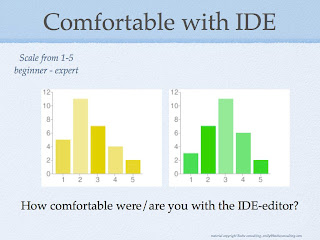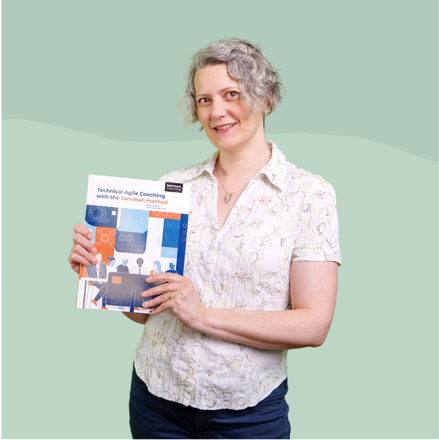A little while ago, Fredrik Wendt and I put together a little survey and sent it to all the people we know who have attended coding dojo meetings here in Göteborg. There are several groups in the city which run these kinds of meetings from time to time. We wanted to know what kinds of things people are learning from practicing code katas in a group, and get some feedback and comments to help us to develop the groups we run.
The survey got 29 responses – thankyou to everyone who participated! I was very encouraged to see that the overwhelming majority – 90% – said they would recommend the dojo to other people who wanted to improve their programming skills. There were lots of comments too – I won’t include them all – but I particularly liked:
Fredrik and I set up JDojo@Gbg about a year ago, as an free coding dojo for Java programmers, sponsored by Iptor. We advertized it as a taught course – 5 sessions, once a month, come and learn TDD. We ran it twice together, and now Fredrik is continuing it together with Ola Berg.
The second sort of coding dojo going on in the town is various language user groups. It must be four years since I pestered Niclas Nilsson and CJ that we should do code Katas at Got.rb (Göteborg Ruby User Group). Inspired by the success of that group, and together with Andrew Dalke and Johan Lindberg, I set up GothPy (Gothenburg Python User Group) about two years ago. More recently, Jonas Nicklas set up Got.js (Göteborg javascript user group) and Jörgen Lundberg set up Scala Geats (Göteborg Scalaenthusiaster). So there are several small, language specific groups that meet and do dojo evenings occasionally, interspersed with other activities.
The third kind of coding dojo meetings going on is where people run them internally at their employer, which lots of people do from time to time. In addition, Fredrik and I are both facilitating these kinds of groups at clients, as part of our work coaching teams and encouraging them to be more agile.
I was pleased that people from all these sorts of groups filled in the survey, and that many people had been to more than one kind.
Most of the survey respondents had been to 4 or 5 dojo meetings:
We asked several questions about perceived skill level before and after participation in dojo meetings. We wanted to know what people thought they were learning, basically.
As you can see, people were fairly good at the programming language in question before the dojo(s), and only reported marginal improvements, 0.3 on average, on a five point scale.
When it comes to the IDE used in the dojo, again, we are looking at a modest improvement, also 0.3 on a five point scale.
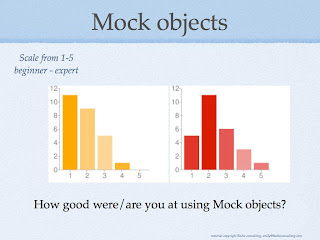
Using Mock Objects is a topic that doesn’t always come up in dojo meetings, I personally have certainly had more of a focus on classic TDD. The feedback shows that people didn’t feel they were that good at it before the meetings, and not that much better afterwards – an average 0.5 increase on a 5 point scale. From some of the comments, I think this is an area to focus on more in future. To that end, we’re having a GothPy meeting next week looking at Mockist TDD 🙂
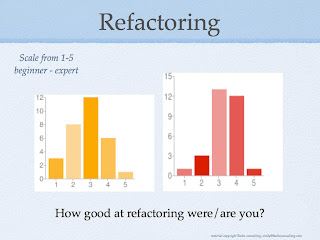
Refactoring is an essential part of Test Driven Development, and in fact any modern programmer’s toolbox. I was pleased to see that people thought the dojo had helped them to improve this skill too – 0.5 on a five point scale.
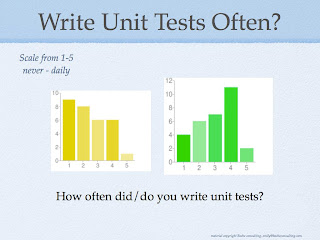
So it looks like going to a dojo encourages you to write unit tests more often – 0.6 (on a five point scale) more often on average.
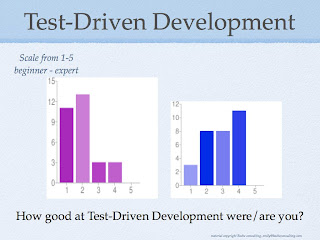
This result is the most pleasing to me, since I think TDD is such an important skill, and it can be so difficult to get going with. People are moving from a low level of skill up to a medium level of skill – a whole 1 point (on a five point scale) on average! No-one is claiming to be a TDD expert yet though, I will have to repeat the survey in a few years and see if anyone is brave enough to claim that by then 😉
Fredrik and I are off to Agile Testing Days in a week or so, where we’ll be presenting a bit about what we’ve been doing at these various groups, and what we recommend for others starting their own coding dojos. We’ve learnt a lot by running these meetings, and had fun too. Hopefully these survey results might encourage you to find a coding dojo and improve your programming skills!




